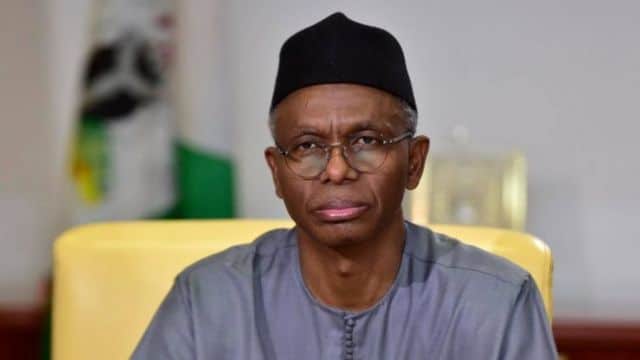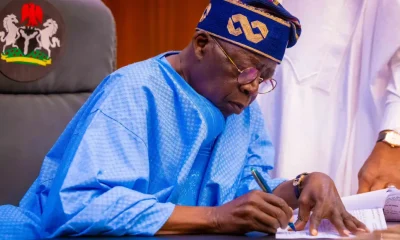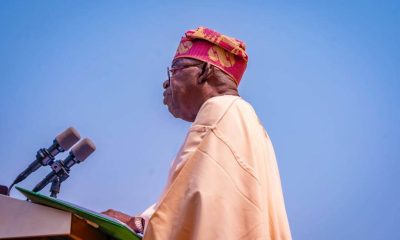Nigeria News
Ministerial Screening: ‘DSS Allegations Levelled Against El-Rufai’

The confirmation of former Governor of Kaduna State, Nasir El-Rufai as minister in the administration of President Bola Tinubu is hanging in the air.
While the 10th Senate led by Godswill Akpabio confirmed forty-five ministerial nominees, El-Rufai and two others were not confirmed over security-related petitions.
According to Premium Times, there are allegations of human rights abuses, unguarded public utterances, and a purported flood of petitions levelled against El-Rufai.
El-Rufai during the screening was part of former governors on the ministerial list that enjoyed respect from senators during the screening exercise on 2 August.
However, during the screening the lawmaker representing Kogi West senatorial district, Sunday Karimi, pointed to a petition against the former Governor, but the move was shut down.
The Senate President, Godswill Akpabio confirmed that the Senate received a series of petitions against some ministerial nominees, and not just El-Rufai, but that such complaints would be referred to the president, who nominated them, and the relevant investigative bodies.
At the end of confirmation proceedings on Monday, El-Rufai, who many thought had a smooth sail, was among just three nominees whose confirmations were withheld.
The two others were a former senator from Taraba, Sani Danladi, and a nominee from Delta State, Stella Okotete.
Akpabio said their confirmations would await security clearance, which left many Nigerians wondering what the security issues could be with El-Rufai’s nomination.
Sources that spoke with Premium Times on the allegations levelled against El-Rufai on condition of anonymity said most of the allegations against the former governor were already known to the public.
The platform, however, stated that they could not independently verify the allegations.
The issues include broad and specific allegations, including his widely reported controversial remarks and policies, according to sources with direct knowledge of the complaints by the SSS.
They are broadly categorized as human rights abuses, unguarded utterances and conduct, petitions, public trust abuse, and other sundry issues.
The sources further stated that the SSS did not confront El-Rufai with these allegations.
Allegation of “unguarded statements” is a major thrust of the DSS report on El-Rufai, according to sources who shared their knowledge of the matter.
El-Rufai while addressing a group of Muslim clerics in Kaduna after his party won the 2023 election, said Muslims could rule Kaduna for a long period while also consistently doing justice to Christians.
The comment was widely criticized as divisive in a state where religious and ethnic tensions could quickly lead to bloody clashes.
Months before El-Rufai’s latest comment, a former senator from the state, a political adversary, blamed the worrisome security situation of the state on the utterances of the former governor.
Citing El-Rufai’s latest comment, the DSS, according to sources, said El-Rufai’s public statements inflamed mistrust among the state’s citizens and, by extension, between Muslims and Christians in the country.
The security agency also pointed out El-Rufai’s comment in the build-up to the 2019 general elections, when he said foreign election observers and agents of the international community trying to meddle in Nigeria’s elections would return in body bags.
El-Rufai, who was a governorship candidate seeking a second term at the time, would later clarify that he was only expressing Nigeria’s readiness to “defend itself against needless intervention” by external bodies, saying his comment “is the kind of statement you expect to hear from a patriot”.
The DSS said for that comment, El-Rufai was barred from entering the US, a claim yet to be verified.
The sources said the DSS also recalled a “blasphemy tweet” it said El-Rufai posted in 2013. The agency said this generated uproar when he made the comment.
Concerns were also raised about alleged human rights abuses by El-Rufai while he was governor.
These include the case concerning the killing of the sons and followers of the Shiite leader, Ibraheem El-Zakzaky, in Zaria, Kaduna State, in 2015.
Over 300 followers of the leader of the Islamic Movement in Nigeria (IMN), known to be a body of Shiite Muslims in Nigeria, were killed in the attack by the Nigerian military, according to the report of an enquiry conducted by the El-Rufai-led government of Kaduna State.
Although the military was directly responsible, the operation enjoyed the support of the state government.
Instead of holding the military accountable for the massacre of the Shiites, the government chose to prosecute El-Zakzaky and his wife for the alleged murder of one soldier who was said to have been killed in a confrontation between the military and the Shiites in December 2015.
The case went on for years without the Kaduna State government being able to lead any tangible evidence. The Kaduna State High Court ended up dismissing the case in July 2021.
The El-Zakzaky case, according to the DSS, was reported to the International Criminal Court (ICC) and is being investigated by the United Nations human rights body.
Aside from the El-Zakzaky case, the DSS also accused Mr. El-Rufai of having engaged in arbitrary arrests of political enemies and seizure of properties and wanton demolition of properties of perceived political enemies.
The agency also accused him of using force and intimidation to suppress protests, leading to extrajudicial killings of innocent citizens of the state.
Alleged Financial Misconduct
The DSS also alleged that El-Rufai was facing a series of ongoing litigations for selling federal government assets, although no verifiable proof was provided.
Some other court cases, the DSS also claimed, involved El-Rufai’s alleged embezzlement of public funds, abuse of trusts, allegedly involving the use of cronies, allies and family members for corrupt purposes during his time as head of the Bureau of Public Enterprises (BPE), Minister of the Federal Capital Territory (FCT), and governor of Kaduna State.
The sources added that before his nomination, several petitions were filed against him.
They also said cases were pending against him in different Nigerian and international courts, including the ECOWAS and the ICC.
According to the DSS, the agency also listed some petitions filed against El-Rufai, including one it said was sent to President Tinubu by the Islamic Human Rights Commission.
It also listed an ICC document acknowledging the court’s receipt of a petition requesting the investigation of Mr El-Rufai for acts of genocide and crimes against humanity.
The other cases listed by the DSS, the sources said, were a petition to the National Human Rights Commission and Amnesty International, another one sent to the ICC concerning an alleged forceful takeover of prime land in Kaduna despite court orders, and one other sent to the Kaduna State House of Assembly over the demolition of properties in the state.
There were other sundry issues the DSS raised against Mr El-Rufai.
These include an allegation that he once insulted Northern elders, whom the agency described as “a respected group of statesmen.”
The security report, sources also said, accused El-Rufai of once describing Tinubu as the most corrupt person and vowing that he would never deputize such a person with a tainted profile.
The agency also accused him of attempting to repeal Sharia law in Kaduna State in his dying days in office as Kaduna governor. This was said to be in his desperate bid to appease the Christian population in the state.
According to sources, the DSS described the move as dangerous, with the possibility of triggering clashes in the state.








